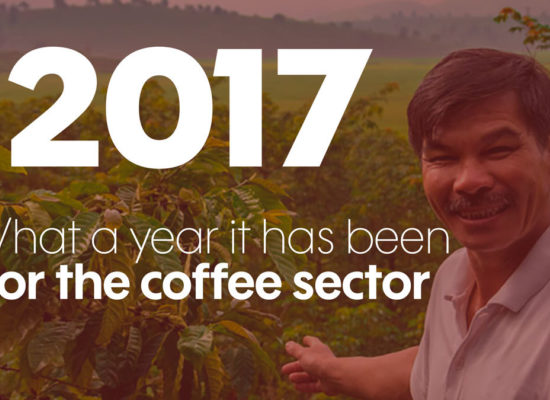A Year of Coffee and Collective Action: GCP Annual Report 2017


The Global Coffee Platform’s Annual Report 2017 captures the sustainability journey of more than 150 members coming together from all parts of the coffee supply chain to improve the livelihoods of coffee farming communities around the world. 2017 featured local action activities that have reached new milestones, whether carrying out several training sessions for agronomists in Uganda or developing a new application to monitor sustainable practices in Brazil, being a GCP Member surely has scale up the impact of the investments done in sustainability projects through the year.
The Annual Report 2017 presents the most relevant results in an interactive journey through the highlights of the year, while offering a deeper look at each National Coffee Platform’s achievements in a special feature accessible at any point during the navigation.
Experience the GCP Member’s sustainability journey in the Annual Report 2017
Last year, GCP Members invested in several projects to generate local impact in the most pressing challenges in coffee farming. With the trust deposited in GCP, several partnerships were agreed to strengthen the National Coffee Platforms to generate more impact where it matters the most: on the ground.
GCP built several promising partnerships with key stakeholders during last year, one of them supported Kenyan farmers to improve their farms economic viability. Another joint effort agreed with Solidaridad, Rainforest Alliance and UTZ, has been fundamental to constitute the first foundations of the Honduran Platform by bringing together different interested parties and defining their roadmap for the upcoming years.
A similar initiative, this time with the support of the United Nations Development Programme (UNDP), has engaged main coffee companies in Peru to release their first joint statistical report, setting a milestone in the country and building trust towards a future Coffee Platform. In Vietnam, the Government has adapted the National Sustainability Curriculum to roll it out to all coffee farmers in the country. This was only possible thanks to the trust deposited in the National Coffee Platform and its proven record of bringing results at origin.

One of the main highlights of the year was the development of the Coffee Sustainability Curriculum (CSC) App in Brazil and its launch in October during the Global Coffee Sustainability Conference 2017. The tool seeks to increase the efficiency of coffee crops, by measuring the sustainable practices aligned with the CSC. This app not only optimizes time for monitoring progress but gathers vital information to improve production for next years. More than 70 technicians and 15 institutions have started training with the app (end of 2017) and it is foreseen that in 2018 the amount of coffee hectares covered will increase exponentially.
National Coffee Platforms are determined to scale sustainable production practices among farmers, this objective was translated in 2017 with a considerable amount of training sessions in coffee producing countries. In Vietnam 100 Master Trainings were conducted; in Brazil, 600 technicians and 1.220 smallholder farmers were trained on the Coffee Sustainability Curriculum; the Indonesia Platform spread its National Sustainability Curriculum in 5 different regions with 64+ master trainings registered; more than 200 Ugandan lead farmers and field staff were educated in the Coffee Specific Extension Program and in three different Tanzanian regions, 100 agronomists were trained.

The Sustainable Trade Platform (Coffee Platform in Colombia), addressed two main challenges –gender inequity and need for research– by conducting an analysis in 5 Colombian coffee regions. Among many interesting outcomes, the study concluded that gender equity strategies have greater impact when directed to the whole family, rather than just focusing on women. On a similar branch, the “Engagement Guide for Gender Equity” was released by the Partnership for Gender Equity with the support of GCP to help catalyze action by industry actors to design and implement interventions in coffee supply chains that can support both men and women coffee farmers. GCP also provided other learning and research opportunities by conducting a workshop in Climate Smart Agriculture (CSA) for Sustainability Managers to sharpen their climate change strategies. Additionally Technoserve published a quick scan on farmer profitability, which identified and benchmarked economic viability of farming, the study was supported by GCP. The Global Coffee Platforms recognizes the considerable need for Research & Development in the coffee sector particularly in view of changing climatic conditions, including on suitable coffee varieties and new technologies for profitable, successful coffee farming also in the future. New collaborations are therefore necessary and underway.
Finally, all previous activities along with many related projects were shared with more than 200 key stakeholders in the coffee sustainability sector during the GCSC 2017 in Geneva. The event brought together leaders in the industry to discuss new ideas and resources to translate individual efforts into global collaboration.

Please follow the steps below if you have problems accessing the content: